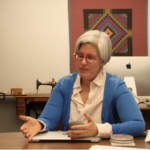
by James C. Sherlock
She is certainly qualified.
On Oct. 17 the Thomas Jefferson Foundation announced that Jane Kamensky, Harvard history professor and director of the Schlesinger Library on the History of Women in America, will be the next president of Monticello.
From an interview with Harvard Crimson.
- “The combination of celebration, commemoration, and reckoning that takes place at Monticello in 2026 will not only do all those things, but will show America how to do it,” she said.
- Kamensky said she looks forward to engaging the American public, especially young people, in a “shifted tone of conversation about American ideals and imperfections and possibilities,” she said.
“Show America how to do it” is an aggressive vision, but we wish her well.
There is evidence that there are mines in that field. She needs to try to carefully clear them, not set them off.
From the same interview:
She described Monticello as a nexus for “people who are attached to many different kinds of narratives about American beginnings — including the narrative that we were a nation founded in slavery, and the narrative that we were a nation founded in liberty.”
“It’s a place that has to confront that with every tour group, every guided group that goes through the house,” she added.
In particular, Kamensky said she sees Monticello as “a place that demonstrates that we can disagree fruitfully and that we can overcome our partisan divides.”
I agree with much in her interview. She seems sincere and not hard left. I agree with the first paragraph quoted above.
But the next two are somewhat charged.
Confront. The use of the verb “confront” in the second paragraph is more than unfortunate. The meanings of confront in the Oxford dictionaries include:
- “meet (someone) face to face with hostile or argumentative intent”;
- “(of a problem, difficulty, etc.) present itself to (someone) so that dealing with it cannot be avoided”;
- “compel (someone) to face or consider something, especially by way of accusation”;
- “appear or be placed in front of (someone) so as to unsettle or threaten”.
Most are looking for a live version of the virtual tour. Just the facts.
She will have to ride herd on the young tour guides. The last thing parents want on a family outing is confrontation on complex issues by people they have never met.
The same caution about off-script musings by guides applies to the live and digital school field trips.
The Monticello Teachers Institute seems ripe for her vision, if she can find social studies teachers willing to speak of Jefferson’s undeniable greatness as well as his weaknesses and sins, including the owning of slaves.
Partisan divides. Most Americans have been disabused of any notion “that disagree fruitfully and that we can overcome our partisan divides.”
In order to do so, Kamensky believes that “we need multiple arguments from multiple sides on any issue to move forward to a more complete truth and a more perfect union.”
Just not on an afternoon outing at Monticello.
Since December 19, 1960, Monticello has been a National Historic Landmark. It is a place for research. But it is not a university classroom.
It achieved National Historic Landmark status on the same day and year as Montpelier, Mount Vernon, the White House of the Confederacy, John Marshall House, Gunston Hall, Lee Chapel at Washington and Lee University, Fort Monroe, Five Forks Battlefield and Oak Hill.
Further:
Kamensky said she sees an opportunity for Monticello to use this trust for “frontline epistemology work with an incredibly diverse American public” and to present “even hard evidence fairly and in a way that is generous to the people who created it, but also rigorous and honest.”
is a branch of philosophy that studies the nature of knowledge. As such, it is enormously complex and the practice of that trade is very unlikely to lead to agreement of what constitutes “hard evidence,” much less on its meaning.
Bottom line. That said, I think Dr. Kamensky has an opportunity to improve the understanding and presentations of both Jefferson and Monticello.
Jefferson himself was a walking contradiction. But he was a true giant in the history of democracy. Not every sentence about him needs to include the word “but.”
She will grow to understand that most of the tourists at that National Historic Landmark don’t go there to hear from or to be lectured to by young guns of the DEI left.

Leave a Reply
You must be logged in to post a comment.